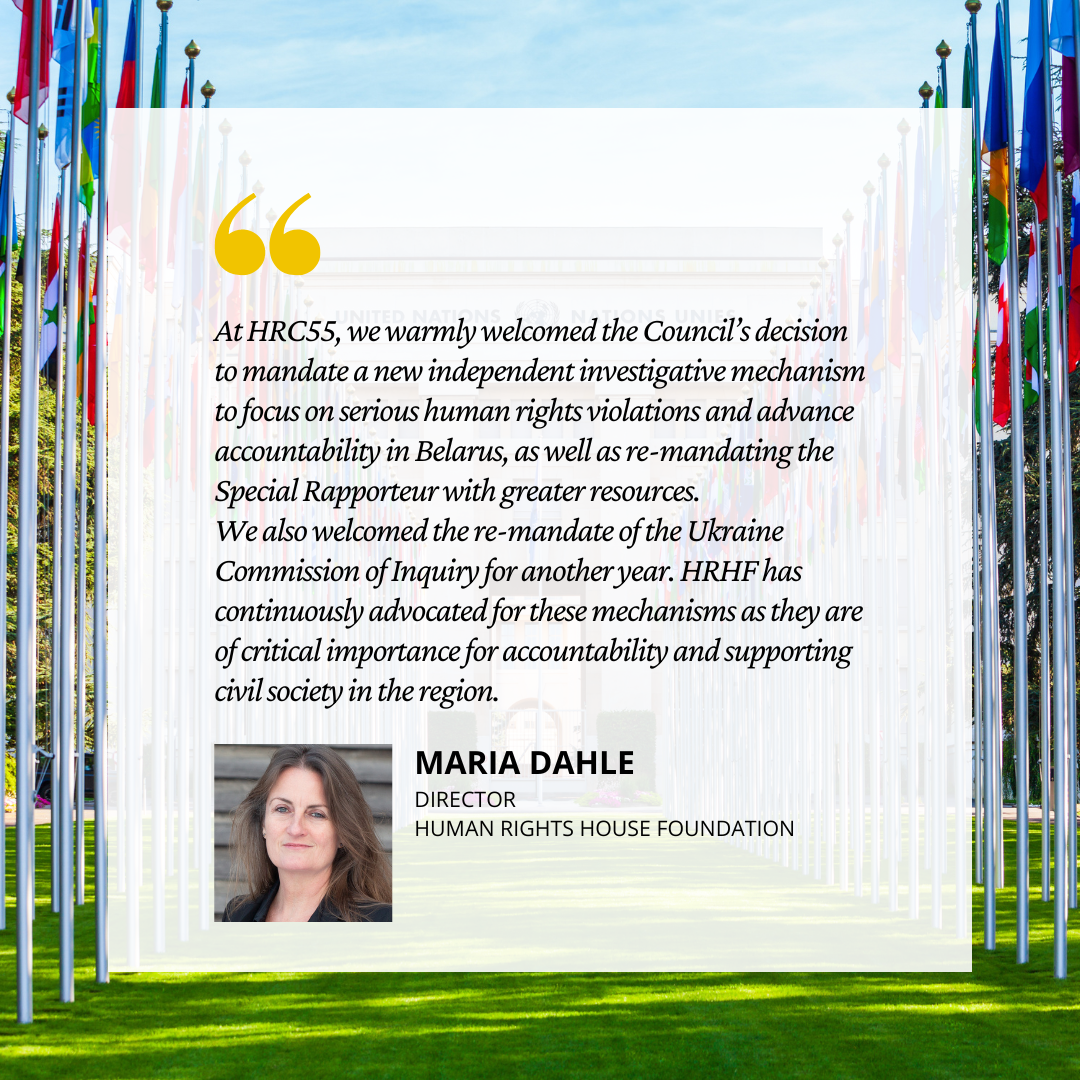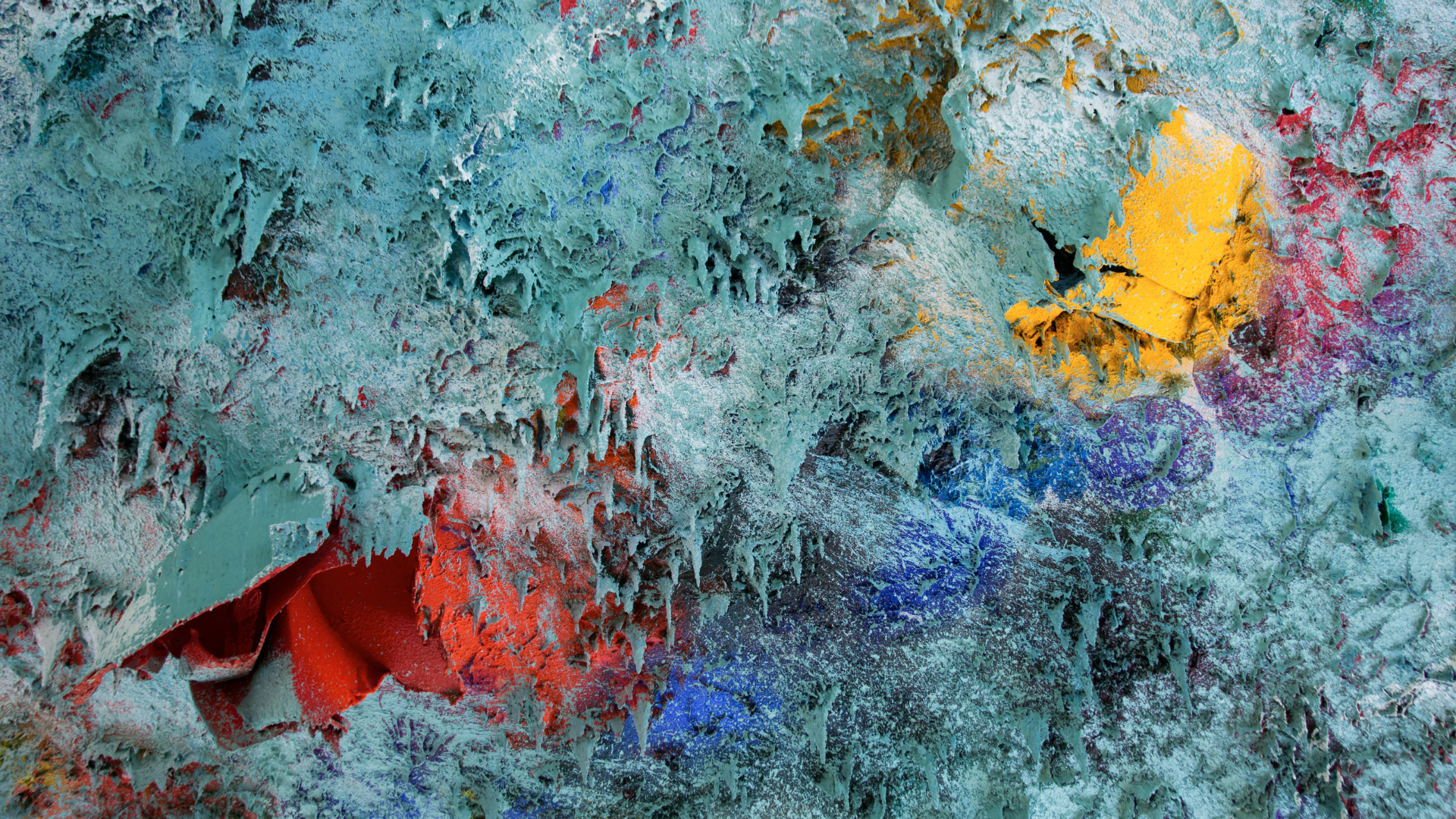
HRHF worked closely with members of the Network of Human Rights Houses, as well as advocacy partners representing INGOs and NGOs from Azerbaijan, Belarus, Georgia, Russia, Serbia, and Ukraine. Together, we raised key human rights issues from the region and called for action through joint statements, side events, and engagement with key mechanisms.
Belarus: Council adopts resolution establishing new investigative mechanism and re-mandating Special Rapporteur
On 4 April, the United Nations Human Rights Council adopted a resolution establishing a new standalone investigative body to advance accountability for human rights violations committed in Belarus. The UN Special Rapporteur on the human rights situation in Belarus will also now receive more resources and greater support from the UN. The resolution on Belarus that made these decisions had stronger support than any resolution on Belarus going back to 2013, signalling the importance of these initiatives to the international community.
HRHF has been pushing for a new investigative mechanism on Belarus for more than a year. At HRC55, HRHF joined Belarusian and international civil society organisations in urging HRC Member States to support the creation of the mechanism, alongside a better-resourced Special Rapporteur in a joint statement issued on 15 March.
HRHF repeated these calls in a statement issued on 20 March, also highlighting the ongoing crackdown against civil society in the country, noting the situation for 1400+ political prisoners in the country including Nobel Peace Prize laureate Ales Bialiatski, Marfa Rabkova, Valiantsin Stefanovic, as well as the death of Ihar Lednik in February.
Ukraine: Human rights issues in the context of the full-scale Russian invasion
In a statement on 2 April, HRHF and partners continued to highlight the human rights situation in the Russian-occupied territories of Ukraine, warning that the human rights situation in occupied Crimea is a blueprint for how Russia seeks to transform the newly occupied territories of Ukraine.
During an interactive dialogue with the Independent International Commission of Inquiry on Ukraine on 19 March, HRHF underscored the importance of returning Ukrainian civilians forcibly taken by Russia within the context of the full-scale invasion. HRHF raised the situation for people who are imprisoned by the occupying authorities, including as a result of their civil society and human rights work, noting in particular the situation for Ukrainian journalist, Iryna Danilovych, kept in dreadful conditions, and Ukrainian researcher Olena Piekh who has been subjected to terrible forms of torture.
UPR Adoption: Russian civil society faces unprecedented challenges
During the adoption of Russia’s UPR on 25 March, HRHF called for the release of Russian political prisoners including Oleg Orlov and Vladimir Kara-Murza, as well as for an independent international investigation into the death of Alexei Navalny in prison on 16 February. HRHF’s statement also highlighted the increasing suppression of civil society, independent media and dissenting voices as a result of laws related to “extremism”, “foreign agents”, and “undesirable organisations”.
UPR Adoption: Renewed crackdown on civil society in Azerbaijan
Since Azerbaijan’s review under the UPR process in November 2023, the human rights situation in Azerbaijan has dramatically deteriorated, including with many politically-motivated detentions and charges against journalists and human rights defenders. On 25 March during Azerbaijan’s UPR adoption, HRHF highlighted the situation for over 230 political prisoners, noting in particular the case of activist, academic and politician Gubad Ibadoghlu who is being denied vital medical care, urging Azerbaijan to undertake reforms that reflect the UPR recommendations.
On 5 March, HRHF hosted a side event at HRC55 on the situation for independent media and civil society in the context of Azerbaijan’s preparations to host Cop29 in November. The event included calls for the release of political prisoners, and for Azerbaijan to provide assurances to the international community that it will create a safe and enabling environment for local and international civil society ahead of November’s global climate conference in Baku.
Resolution adopted on countering disinformation
HRHF welcomed the adoption of a resolution on “Disinformation”. For years, and over the course of several sessions of the Council, HRHF has continued to raise disinformation as a key and growing human rights challenge across the wider region, and urged for stronger international standards to be created to help in addressing the issue.
All HRHF statements and events at HRC55
- 2 April: Human rights situation in Crimea is a blueprint for how Russia seeks to transform the newly occupied territories of Ukraine
- 25 March: Azerbaijan must ensure that all citizens can enjoy fundamental rights and freedoms
- 25 March: Russian civil society faces unprecedented challenges
- 20 March: Council should establish an investigative mechanism on Belarus to build on work of OHCHR Examination
- 19 March: The situation for Ukrainians abducted, forcibly displaced or imprisoned by Russia
- 15 March: INGOs urge HRC Member States to support Belarus mechanisms
- 15 March: SIDE EVENT – Media and Civil Society Under Pressure in Azerbaijan Ahead of COP29





